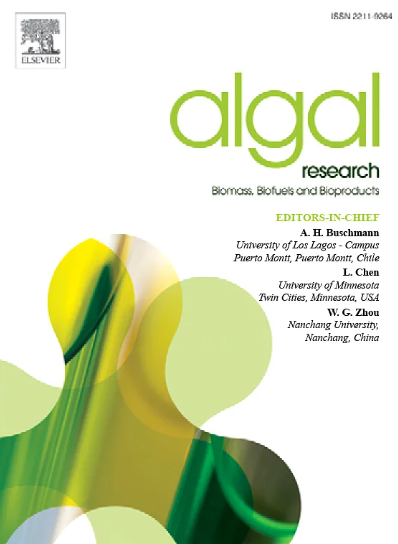Mechanochemical synthesis of N-doped porous cyanobacteria-based biochar for decontamination of antibiotic wastewater
IF 4.5
2区 生物学
Q1 BIOTECHNOLOGY & APPLIED MICROBIOLOGY
Algal Research-Biomass Biofuels and Bioproducts
Pub Date : 2025-07-23
DOI:10.1016/j.algal.2025.104238
引用次数: 0
Abstract
N-doped porous cyanobacterial-based biochar (N-PBC) was synthesized via ball milling coupled with pyrolysis and demonstrated as a high-performance adsorbent for enrofloxacin (ENR) removal. Compared to raw biochar (BC, 25.06 mg g−1), N-PBC exhibited a significantly enhanced adsorption capacity of 51.02 mg g−1 (adsorbent dosage 0.05 g L−1, 298 K), corresponding to removal efficiencies of 22.48 % and 12.17 % for N-PBC and BC, respectively. Adsorption kinetics for both biochar followed the pseudo-second-order model, suggesting chemisorption-dominated mechanisms, while isotherms aligned with the Langmuir model, indicating monolayer adsorption. Thermodynamic analysis confirmed the spontaneous and endothermic nature of ENR adsorption. N-PBC maintained stable adsorption capacity across varying pH conditions and in the presence of common anions, alongside excellent regeneration performance. This study innovatively transforms cyanobacterial waste into functional N-doped biochar, showcasing its superior design for active sites and surface area. The findings underscore cyanobacterial waste biochar significant potential as a sustainable, efficient adsorbent for antibiotic remediation in water treatment applications.
机械化学合成氮掺杂多孔蓝藻生物炭对抗生素废水的去污
采用球磨-热解法制备了氮掺杂多孔蓝藻生物炭(N-PBC),并证明其是一种去除恩诺沙星(ENR)的高效吸附剂。与生炭(BC, 25.06 mg g−1)相比,N-PBC的吸附量显著提高,达到51.02 mg g−1(吸附剂用量0.05 g L−1,298 K),对N-PBC和BC的去除效率分别为22.48%和12.17%。两种生物炭的吸附动力学均符合准二级模型,表明化学吸附为主,而等温线符合Langmuir模型,表明单层吸附。热力学分析证实了ENR吸附的自发和吸热性质。N-PBC在不同的pH条件下和普通阴离子存在下保持稳定的吸附能力,同时具有优异的再生性能。本研究创新地将蓝藻废物转化为功能性掺氮生物炭,展示了其在活性位点和表面积上的优越设计。这些发现强调了蓝藻废物生物炭作为水处理应用中抗生素修复的可持续、高效吸附剂的巨大潜力。
本文章由计算机程序翻译,如有差异,请以英文原文为准。
求助全文
约1分钟内获得全文
求助全文
来源期刊

Algal Research-Biomass Biofuels and Bioproducts
BIOTECHNOLOGY & APPLIED MICROBIOLOGY-
CiteScore
9.40
自引率
7.80%
发文量
332
期刊介绍:
Algal Research is an international phycology journal covering all areas of emerging technologies in algae biology, biomass production, cultivation, harvesting, extraction, bioproducts, biorefinery, engineering, and econometrics. Algae is defined to include cyanobacteria, microalgae, and protists and symbionts of interest in biotechnology. The journal publishes original research and reviews for the following scope: algal biology, including but not exclusive to: phylogeny, biodiversity, molecular traits, metabolic regulation, and genetic engineering, algal cultivation, e.g. phototrophic systems, heterotrophic systems, and mixotrophic systems, algal harvesting and extraction systems, biotechnology to convert algal biomass and components into biofuels and bioproducts, e.g., nutraceuticals, pharmaceuticals, animal feed, plastics, etc. algal products and their economic assessment
 求助内容:
求助内容: 应助结果提醒方式:
应助结果提醒方式:


